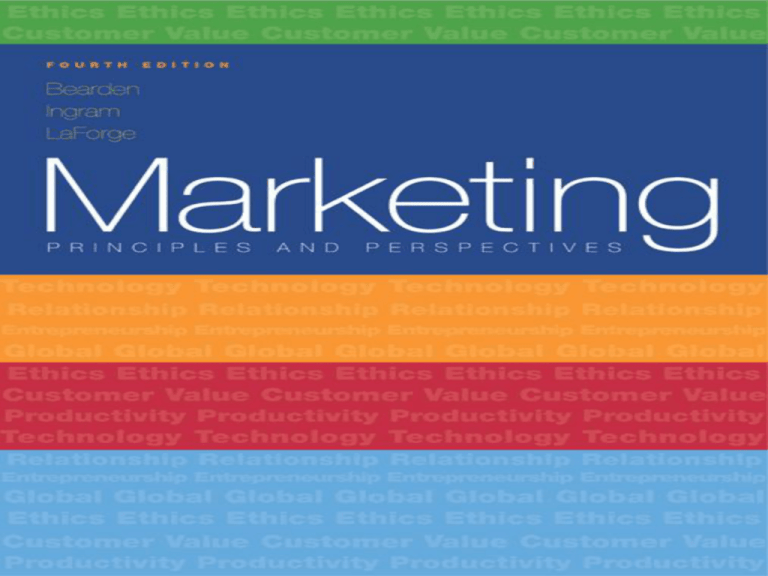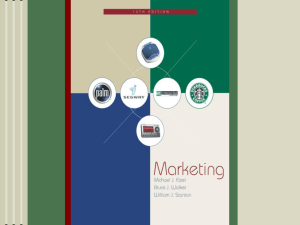
1-1Irwin/McGraw-Hill
Copyright © 2001 by The McGraw-Hill Companies, Inc. All rights reserved.
Chapter 5
Business-to-Business Markets and Buying Behavior
1-2
MIrwin/McGraw-Hill
cGraw-Hill/Irwin
Copyright
© 2001
by The
McGraw-Hill
Inc.
rights
reserved.
Copyright
© 2004
by The
McGraw-Hill Companies,
Companies, Inc.
All All
rights
reserved.
After studying this chapter, you
should be able to:
Define
the nature of business-to-business
buying behavior and markets.
Explain
the differences between businessto-business buying and consumer
purchase behavior.
Recognize
the different types of buying
decisions.
1-3Irwin/McGraw-Hill
Copyright © 2001 by The McGraw-Hill Companies, Inc. All rights reserved.
After studying this chapter, you
should be able to:
Define
the different stages of the business
buying process.
Describe
the buying-center concept and
the determinants of influence within the
buying center.
Understand
the nature of government,
reseller, and other institutional markets.
1-4Irwin/McGraw-Hill
Copyright © 2001 by The McGraw-Hill Companies, Inc. All rights reserved.
The Nature of Business-to-Business
Buying
Business-toBusiness buying
behavior:
1-5Irwin/McGraw-Hill
Refers to decision
making and other
activities of
organizations as
buyers.
Business-toBusiness buying is
the selection of
suppliers, sources,
or vendors.
Copyright © 2001 by The McGraw-Hill Companies, Inc. All rights reserved.
The Nature of Business-toBusiness Buying
Organizations fall into
four categories:
1-6Irwin/McGraw-Hill
Business firms
Government markets
Reseller markets
Institutional markets
Copyright © 2001 by The McGraw-Hill Companies, Inc. All rights reserved.
Supply-Chain Management
Supply-Chain
Management:
1-7Irwin/McGraw-Hill
“The integration of
business processes from
end user through original
suppliers that provides
products, services, and
information that add
value for customers.”
Copyright © 2001 by The McGraw-Hill Companies, Inc. All rights reserved.
Supply Management
Supply
1-8Irwin/McGraw-Hill
Management:
“The identification, acquisition, access,
positioning, and management of resources
the organization needs or potentially needs
in the attainment of its strategic objectives.”
Copyright © 2001 by The McGraw-Hill Companies, Inc. All rights reserved.
Characteristics of Business-toBusiness Buying Behavior
Consumers buy for
their own use and
for household
consumption.
1-9Irwin/McGraw-Hill
Business buyers
purchase for:
Further production
(raw materials,
components)
Use in their firm’s
operations
Resale to other
customers
Copyright © 2001 by The McGraw-Hill Companies, Inc. All rights reserved.
Characteristics of Business-toBusiness Buying Behavior
Derived Demand:
Irwin/McGraw-Hill
1-10
Demand for business-to-business products is often
dependent on demand in consumer markets.
Copyright © 2001 by The McGraw-Hill Companies, Inc. All rights reserved.
Evaluating Business-to-Business
Markets: NAICS
Irwin/McGraw-Hill
1-11
Copyright © 2001 by The McGraw-Hill Companies, Inc. All rights reserved.
The Importance of Business-toBusiness Buying
Two Key Reasons:
1.
The size of business markets
offers many opportunities for
marketers.
2.
Many firms are trying to increase
profits by improving purchasing
practices.
Irwin/McGraw-Hill
1-12
Copyright © 2001 by The McGraw-Hill Companies, Inc. All rights reserved.
Trends in Business-to-Business
Buying
Selected Purchasing Trends 1998-2008
1. Electronic Commerce
2. Strategic Cost
management
3. Strategic Sourcing
4. Supply-chain partner
selection &
contribution
5. Relationship
management
6. Performance
measurement
Irwin/McGraw-Hill
1-13
7. Global-supplier
development
8. Third-party purchasing
9. Competitive bidding
10. Strategic supplier
alliances
11. Win-win negotiation
strategy
12. Complexity management
Copyright © 2001 by The McGraw-Hill Companies, Inc. All rights reserved.
Productivity Improvement
Outsourcing
Corporate downsizing
often involves downsizing
of the purchasing function
Reducing cycle time
Irwin/McGraw-Hill
1-14
Copyright © 2001 by The McGraw-Hill Companies, Inc. All rights reserved.
Use of Technology
B2B Exchanges:
Organizational buying via the Internet.
Private Exchanges:
Irwin/McGraw-Hill
1-15
Those that link invitation-only buyers
and sellers.
Copyright © 2001 by The McGraw-Hill Companies, Inc. All rights reserved.
Electronic Commerce Applications
in Purchasing
Requesting proposals and price quotes.
Posting bids.
Transmitting purchase orders.
Using Electronic Data Interchanges.
Ordering with electronic catalogs.
Seeking suppliers.
Tracking delivery schedules.
Managing contracts.
Managing inventory.
Paying invoices/making payments.
Irwin/McGraw-Hill
1-16
Copyright © 2001 by The McGraw-Hill Companies, Inc. All rights reserved.
A Relationship Perspective
Irwin/McGraw-Hill
1-17
Copyright © 2001 by The McGraw-Hill Companies, Inc. All rights reserved.
Customer Value Considerations
Buyers are interested in suppliers that can add
value to their business by:
Irwin/McGraw-Hill
1-18
Continually increasing quality
Lowering costs
Copyright © 2001 by The McGraw-Hill Companies, Inc. All rights reserved.
Environmental Impact
Buyers emphasize an Ethics
Perspective by:
Examining the costs associated with
product disposal.
Looking for ways to recycle or reuse
products.
Irwin/McGraw-Hill
1-19
Copyright © 2001 by The McGraw-Hill Companies, Inc. All rights reserved.
Types of Buying Decisions
The Buying Decision Grid
Type of Buying
Decision
Newness of
the Problem
Information
Consideration of
Requirements New Alternatives
New task
High
Maximum
Important
Modified rebuy
Medium
Moderate
Limited
Straight rebuy
Low
Minimal
None
Irwin/McGraw-Hill
1-20
Copyright © 2001 by The McGraw-Hill Companies, Inc. All rights reserved.
The Business Buying Process
Irwin/McGraw-Hill
1-21
Copyright © 2001 by The McGraw-Hill Companies, Inc. All rights reserved.
The Buying Center
Buying Center:
Includes more than the purchasing department or the
purchasing function; it is made up of people
throughout the organization at all levels.
The makeup of the buying center
may vary as decisions change.
Irwin/McGraw-Hill
1-22
Copyright © 2001 by The McGraw-Hill Companies, Inc. All rights reserved.
The Buying Center
Gatekeepers:
Control the flow of information and
communication among the buying-center
participants.
Sponsor:
Irwin/McGraw-Hill
1-23
Advocates purchase of a particular product
of service.
Copyright © 2001 by The McGraw-Hill Companies, Inc. All rights reserved.
Government Markets
Government Market:
Includes federal, state, and local government
organizations that purchase goods and services.
Irwin/McGraw-Hill
1-24
The government market is the
largest in the world, with the United
States federal government the
largest customer in this market
Copyright © 2001 by The McGraw-Hill Companies, Inc. All rights reserved.
Reseller Markets
3.5 million companies with more
than 20 million employees make
up reseller markets.
Irwin/McGraw-Hill
1-25
Reseller Market:
Made up of firms that
purchase goods and in
turn sell them to others
at a gain.
This market includes:
Wholesalers
Retailers
Copyright © 2001 by The McGraw-Hill Companies, Inc. All rights reserved.
Other Institutional Markets
Nonprofit organizations
must also purchase goods
and services to support their
activities.
These organizations include:
Irwin/McGraw-Hill
1-26
Educational institutions
Public & private hospitals
Religious & charitable organizations
Trade associations
Copyright © 2001 by The McGraw-Hill Companies, Inc. All rights reserved.
Ethical Issues
Ethics is a constant
concern in
business-tobusiness
negotiations and
transactions.
Irwin/McGraw-Hill
1-27
Bribery takes many
forms:
Gifts from vendors to
people involved in
decision making
“Money under the table”
Promises for the future
Copyright © 2001 by The McGraw-Hill Companies, Inc. All rights reserved.
Ethical Issues
Reciprocity:
When firm A purchases from supplier B who
in turn buys A’s own products and services.
Fairness, honesty, and trust should influence all
negotiations and selection of suppliers or vendors.
Firms pursuing global markets
encounter ethical dilemmas.
Irwin/McGraw-Hill
1-28
Copyright © 2001 by The McGraw-Hill Companies, Inc. All rights reserved.






